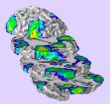(Press-News.org) Positive emotions – even those viewed through a distorted lens – may play an exacerbating role in fueling eating disorders like anorexia nervosa, which has a death rate 12 times higher for females between the ages of 15 and 24 than all other causes of death combined, according to a Rutgers study.
In research published in Clinical Psychological Science, Edward Selby, an assistant professor in the Department of Psychology, School of Arts and Sciences, measured over a two week period the emotional states of 118 women between the ages of 18-58 being treated for anorexia nervosa.
Selby found that those in the study not only suffered from negative emotions but also felt emotionally positive, having a sense of pride over being able to maintain and exceed their weight-loss goals.
"What we think happens is that positive emotions become exaggerated and are rewarding these maladaptive behaviors," said Selby. "Since only about one-third of women recover after treatment, what we need to do is gain a better understanding of why these positive emotions become so strongly associated with weight loss rather than with a healthy association such as family, school or relationships."
Previous research into eating disorders has focused mainly on how negative emotions, like being sad, angry, or having a lack of control contribute to anorexia, an emotional disorder characterized by an obsessive desire to lose weight by refusing to eat. "Up until now," Selby said, "there has been little analysis of empirical data that could help gain insight into how positive emotions are distorted by those suffering with the illness."
In this study, Selby and his colleagues found that the women in the study who had the most difficulty understanding how to recognize when positive emotions were becoming skewed, engaged in more frequent anorexia-type behaviors like vomiting, laxative use, restricting calories, excessive exercise, checking body fat and constant weight checks.
"Women with anorexia are often in complex emotional places, that is why it is important to understand all we can about what they are getting out of this experience," said Selby. "The more we know not only about the negative emotions, but also the positive emotions connected to this disease, the more likely we will be to treat this devastating illness."
Much of the positive reinforcement that may lead women with anorexia to feel good about their situation could be coming from "Pro-Anorexic" websites, where it is not unusual for individuals suffering with anorexia to be applauded for their control and courage in obtaining extreme weight loss.
This link between positive emotions and weight-loss behaviors, Selby said, turns into a vicious cycle for some women suffering with eating disorders who continue to lose weight even after their goals are met.
Selby believes that more research is needed to find a way to redirect positive emotions associated with emaciation to other healthy activities, and determine how these feelings should be addressed in treating those with eating disorders.
Physical activity, for instance, might need to be looked at in a different way, Selby said. While there is debate about whether patients undergoing treatment for anorexia should be allowed to exercise, working out is an activity that makes them feel good. So instead of completely barring physical fitness, perhaps an individual who has gained pleasure from a sport like running could be steered toward a group activity like yoga, which is focused more on core strengthening and not weight loss, he said.
"Being in control is important for many of these women," Selby said. "What we need to do is find a way to reconnect the positive emotions they feel in losing weight to other aspects of their lives that will lead to a more balanced sense of happiness."
INFORMATION: END
Anorexia fueled by pride about weight loss
Rutgers study finds that positive emotions could play a role in the deadly disorder
2014-08-04
ELSE PRESS RELEASES FROM THIS DATE:
Satellite view of a hyperactive Eastern and Central Pacific Ocean
2014-08-04
NASA and NOAA satellites have been supplying forecasters with data developing tropical cyclones in the Eastern and Central Pacific Ocean and over the last several days. There have been as many as five tropical systems at the same time. On Monday, August 4, there were three tropical systems stretching from west to east: Tropical Depression Genevieve in the Central Pacific, Hurricane Iselle and Tropical Storm Julio in the Eastern Pacific.
Tropical Depression Genevieve May Strengthen
On August 4, Tropical Depression Genevieve was located about 930 miles (1,495 km) southwest ...
Version 2.0 of Prostate Cancer Risk Calculator now online, complete with emojis
2014-08-04
SAN ANTONIO (August 4, 2014) — A calculator to help men and their doctors assess their risk of prostate cancer, developed at the UT Health Science Center, has had a major upgrade to enhance how men and their physicians better understand a man's risk of prostate cancer.
A description of the update's needs and benefits is described by the Health Science Center authors in a viewpoint published online Monday in the Journal of the American Medical Association.
"The prostate cancer risk calculator has been updated using current risk factors and a better interface; the current ...
Newly discovered juvenile whale shark aggregation in Red Sea
2014-08-04
Whale sharks (Rhincodon typus)—which grow more than 30 feet long—are the largest fish in the world's ocean, but little is known about their movements on a daily basis or over years. A newly discovered juvenile whale shark aggregation off Saudi Arabia is giving researchers a rare glimpse into the lives of these gentle giants.
Scientists from the Woods Hole Oceanographic Institution (WHOI) and colleagues from the King Abdullah University of Science and Technology (KAUST) and Massachusetts Division of Marine Fisheries report on the movements of whale sharks tagged at the ...
Horses communicate with their eyes and mobile ears
2014-08-04
Horses are sensitive to the facial expressions and attention of other horses, including the direction of the eyes and ears. The findings, reported in the Cell Press journal Current Biology on August 4, are a reminder for us humans to look beyond our own limitations and recognize that other species may communicate in ways that we can't, the researchers say. After all, human ears aren't mobile.
"Our study is the first to examine a potential cue to attention that humans do not have: the ears," says Jennifer Wathan of the University of Sussex. "Previous work investigating ...
Declining intelligence in old age linked to visual processing
2014-08-04
Researchers have uncovered one of the basic processes that may help to explain why some people's thinking skills decline in old age. Age-related declines in intelligence are strongly related to declines on a very simple task of visual perception speed, the researchers report in the Cell Press journal Current Biology on August 4.
The evidence comes from experiments in which researchers showed 600 healthy older people very brief flashes of one of two shapes on a screen and measured the time it took each of them to reliably tell one from the other. Participants repeated ...
Prenatal alcohol exposure alters development of brain function
2014-08-04
In the first study of its kind, Prapti Gautam, PhD, and colleagues from The Saban Research Institute of Children's Hospital Los Angeles found that children with fetal alcohol spectrum disorders (FASD) showed weaker brain activation during specific cognitive tasks than their unaffected counterparts. These novel findings suggest a possible neural mechanism for the persistent attention problems seen in individuals with FASD. The results of this study will be published in Cerebral Cortex on August 4.
"Functional magnetic resonance imaging (fMRI) has been used to observe ...
Mid-level scientists most likely to use new research tools, says study in INFORMS journal
2014-08-04
Scientists in the middle of the status hierarchy, not those at the top or the bottom, are the first to work with easy-to-use commercial products. They are also the most prone to imitate their prior collaborators' use of such commercial kits. These are among the findings of a study of scientists-as-customers appearing in Marketing Science, a journal of the Institute for Operations Research and the Management Sciences (INFORMS).
Nonmonotonic Status Effects in New Product Adoption is by Yansong Hu of the University of Warwick and Christophe Van den Bulte of the University ...
Animalistic descriptions of violent crimes increase punishment of perpetrators
2014-08-04
Describing criminals and criminal activities with animal metaphors leads to more retaliation against perpetrators by inducing the perception that they're likely to continue engaging in violence, a new Aggressive Behavior study suggests.
When surveying jury?eligible adults, investigators varied animalistic descriptions of a violent crime and examined its effect on the severity of the punishment for the act. Compared with non?animalistic descriptions, animalistic descriptions resulted in significantly harsher punishment for the perpetrator due to an increase in perceived ...
Evolutionary explanation for why some lessons more easily learned than others
2014-08-04
It's easy to guess why it doesn't take long to learn to avoid certain behaviors and embrace others. But how do we know what drives these predilections? A study led by Aimee Dunlap at the University of Missouri-St. Louis, and co-authored by University of Minnesota researcher David Stephens, offers insight into the evolutionary underpinning of animals' innate ability to quickly absorb critical life lessons.
Animals are flooded with stimuli, but survival often depends on their ability to form specific associations that enhance fitness while ignoring others entirely. Psychologists ...
Enhancing biofuel yields from biomass with novel new method
2014-08-04
RIVERSIDE, Calif. — A team of researchers, led by Professor Charles E. Wyman, at the University of California, Riverside's Bourns College of Engineering have developed a versatile, relatively non-toxic, and efficient way to convert raw agricultural and forestry residues and other plant matter, known as lignocellulosic biomass, into biofuels and chemicals.
The patent-pending method, called Co-solvent Enhanced Lignocellulosic Fractionation (CELF), brings researchers closer to solving the long elusive goal of producing fuels and chemicals from biomass at high enough yields ...
LAST 30 PRESS RELEASES:
Cal Poly’s fifth Climate Solutions Now conference to take place Feb. 23-27
Mask-wearing during COVID-19 linked to reduced air pollution–triggered heart attack risk in Japan
Achieving cross-coupling reactions of fatty amide reduction radicals via iridium-photorelay catalysis and other strategies
Shorter may be sweeter: Study finds 15-second health ads can curb junk food cravings
Family relationships identified in Stone Age graves on Gotland
Effectiveness of exercise to ease osteoarthritis symptoms likely minimal and transient
Cost of copper must rise double to meet basic copper needs
A gel for wounds that won’t heal
Iron, carbon, and the art of toxic cleanup
Organic soil amendments work together to help sandy soils hold water longer, study finds
Hidden carbon in mangrove soils may play a larger role in climate regulation than previously thought
Weight-loss wonder pills prompt scrutiny of key ingredient
Nonprofit leader Diane Dodge to receive 2026 Penn Nursing Renfield Foundation Award for Global Women’s Health
Maternal smoking during pregnancy may be linked to higher blood pressure in children, NIH study finds
New Lund model aims to shorten the path to life-saving cell and gene therapies
Researchers create ultra-stretchable, liquid-repellent materials via laser ablation
Combining AI with OCT shows potential for detecting lipid-rich plaques in coronary arteries
SeaCast revolutionizes Mediterranean Sea forecasting with AI-powered speed and accuracy
JMIR Publications’ JMIR Bioinformatics and Biotechnology invites submissions on Bridging Data, AI, and Innovation to Transform Health
Honey bees navigate more precisely than previously thought
Air pollution may directly contribute to Alzheimer’s disease
Study finds early imaging after pediatric UTIs may do more harm than good
UC San Diego Health joins national research for maternal-fetal care
New biomarker predicts chemotherapy response in triple-negative breast cancer
Treatment algorithms featured in Brain Trauma Foundation’s update of guidelines for care of patients with penetrating traumatic brain injury
Over 40% of musicians experience tinnitus; hearing loss and hyperacusis also significantly elevated
Artificial intelligence predicts colorectal cancer risk in ulcerative colitis patients
Mayo Clinic installs first magnetic nanoparticle hyperthermia system for cancer research in the US
Calibr-Skaggs and Kainomyx launch collaboration to pioneer novel malaria treatments
JAX-NYSCF Collaborative and GSK announce collaboration to advance translational models for neurodegenerative disease research
[Press-News.org] Anorexia fueled by pride about weight lossRutgers study finds that positive emotions could play a role in the deadly disorder




